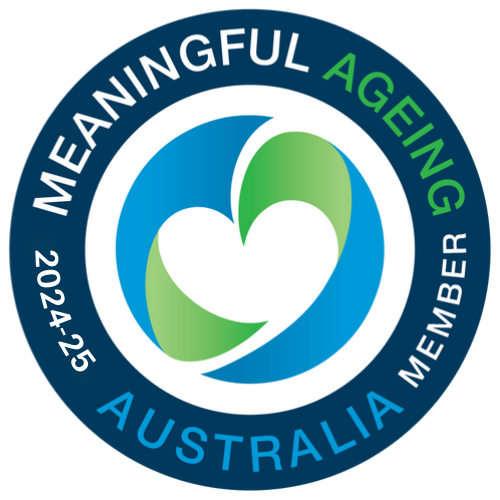As we get older, the importance of dental health increases as our enamel breaks down. The Australian Dental Association, supported by the NSW Government, in association with NSW Health have released some new handy dental health advice videos and information that we’ve summarised into some recommendations below.

Taking Care of Dentures
Dentures, seen as a lifeline for many seniors, help regain the ability to chew their favorite foods with ease as well as allow for a beautiful, youthful smile.
Just like our teeth, dentures should be cleaned morning and night – however, not in the same way. Dentures need to be cleaned outside of the mouth with a soft bristle brush and a non-abrasive cleanser such as hand soap. Toothpaste should NOT be used on dentures as they can strip the acrylic of its pink colour.
Taking dentures out overnight prevents fungal infections that affect gums and soft tissue where they sit. Because of this, it’s advised that one can leave the denture in either a clean, dry location or a container of water whilst you sleep.
Sometimes hard tartar may build up on the denture over time, but this can be easily remedied. How you may wonder? You can use specific cleansing solutions or even a homemade solution of 1 part vinegar and 4 parts water! Simply leave the dentures in the solution overnight and clean as normally in the morning. If this doesn’t do the trick, visit a dental professional.
Brushing Expert Tips
Ever question if you’re following the techniques and tricks to ensure perfect pearly whites? When it comes to brushing there are, surprisingly, a lot of misconceptions as to what “doing a good job” means, but we’ve got the professional recommendations summarised for you.
- Softer brushes tend to be kinder to our gums and teeth, as harder bristles can cause unwanted damage. Additionally, don’t let toothpaste ads fool you – only a pea sized amount of toothpaste is needed. Brush in gentle circular motions, unless you have an electric toothbrush – just leave it to spin in place for 3 seconds.
- An entertaining way to get the right amount of time spend on cleaning your teeth is to play a song or think of one you know really well in your head. About 3 minutes is all it takes to do your regular brush.
- Tilting your bush 45 degrees allows bristles to gently scrub any residue at the edge of your gums, ensuring they are as clean as the tooth.
- We can think of our teeth as 2 groups of 3 separate segments: Upper and Lower. Outside, Inside and chewing surfaces. Count these as you brush. Your inside front teeth sometimes require a little extra attention as they are at an awkward angle compared to the rest of your teeth so simply hold your toothbrush at a 90-degree angle and go up and down on the inside of your teeth.
- A final step is to give your tongue a brush to remove bacteria and give a nice, fresh feel. Try not to rinse when you are done as you want the toothpaste to work for as long as possible.
As a standard of dental care, aim to brush in the mornings and evenings. Remember to visit a dentist regularly for check-ups and early issue detection.
Flossing Expert Tips
Flossing is a vital part of oral care that we may be less enthusiastic about. Did you know it’s recommended that we floss daily? A lot of people are deterred from flossing as it’s painful or causes our gums to bleed, but this is completely normal and should dissipate after 2 weeks’ time.
If pain is an issue, you might be going too deep into the gum too fast. Go in a slow, steady sawing motion with around 30-40cm of floss, wrapping around your finger as you finish on each tooth to get a new fresh area of the floss.
If your gums look like triangles on certain areas, floss gently on either side of the triangle to ensure a full clean.
Remember, brushing alone reaches 60% of our tooth surfaces – the inclusion of flossing gets the remaining 40%, giving you a perfect clean!
Tooth Decay and Gum Disease Prevention
Tooth decay and gum disease are a common occurrence, but completely preventable with the right approach. The most common factors are poor diet and hygienic care of the teeth. With this in mind, ensuring a brushing routine, twice a day, and flossing routine, daily, can make a huge difference in preventing tooth decay and gum disease. A diet with low sugars and acids, such as carbonated drinks, can also drastically factor into this.
A final piece of advice is to regularly visit the dentist. For some a trip to the dentist may be a little daunting, especially if you have dental issues, but it’s important to remember that they aren’t there to judge your lifestyle or dental health, they just want you to have a healthy, clean mouth!
Oral Health for seniors is extremely important to your overall health and well-being. Poor oral health can be the cause and sign of multiple diseases and chronic conditions such as diabetes and heart disease. Check out our other post on Oral Health Care for Seniors here.








